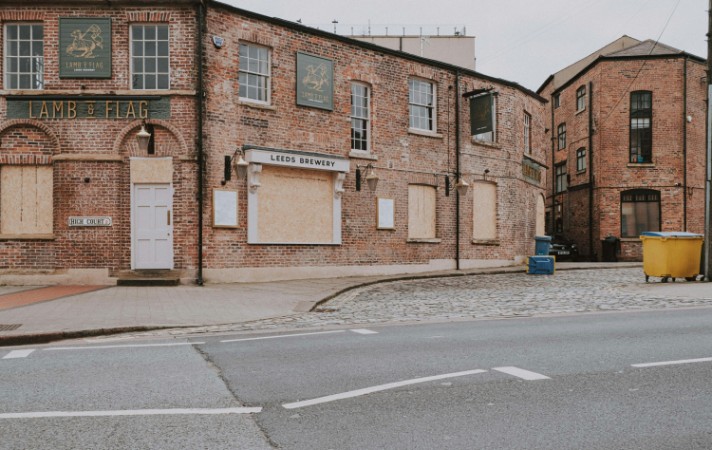Commercial property in the UK has long been seen as a great investment from foreign and local investors.
The UK has a relatively stable economy, great potential for economic growth and a robust legal and regulatory system. All of these factors make it a decibel location to buy commercial property.
Brown Turner Ross has been involved with commercial property law for many years.
We’ve got a team of commercial property law experts who have the knowledge and skills to help you navigate the UK commercial property legalities.
In this article, we will go into detail about the legal considerations of buying commercial property in the UK.
What is classed as commercial property?

Commercial property generally refers to real estate that is used for business or commercial purposes rather than residential purposes.
It encompasses a variety of property types and includes:
- Office buildings – Properties used for administrative or professional services, including office spaces, business parks, and coworking spaces.
- Retail properties – Buildings used for the sale of goods or services to consumers, such as shops, shopping centres, malls, and standalone retail stores.
- Industrial properties – Facilities used for manufacturing, warehousing, distribution, or research and development activities.
- Hospitality properties – Properties used for lodging, dining, or entertainment purposes, such as hotels, restaurants, pubs, bars, and entertainment venues.
- Healthcare properties – Facilities used for medical services, including hospitals, clinics, medical offices, and nursing homes.
- Specialised properties – Other types of commercial real estate, such as educational facilities (e.g., schools, universities), religious buildings (e.g., churches, mosques), recreational properties (e.g., sports facilities, gyms), and mixed-use developments combining commercial and residential elements.
How to buy a commercial property in the UK.

Here’s a general guide for buying commercial property in the UK:
Step 1: Determine your requirements
Define what type of commercial property you need (office space, retail space, industrial property, etc.), its location, size, budget, and any specific requirements. Also consider whether you are best buying the property in your personal capacity or within a company structure.
Step 2: Find suitable properties

Look for commercial properties that meet your criteria. You can use property websites, commercial property portals, local newspapers, or hire a commercial property agent.
Step 3: View properties
Once you identify potential properties, arrange viewings to inspect them personally. Assess the condition, location, accessibility, and suitability for your business needs.
Step 4: Conduct due diligence
Before making an offer, conduct thorough due diligence. This involves investigating the legal, financial, and physical aspects of the property.
Key considerations include title deeds, planning permissions, leases, environmental assessments, surveys, and building condition reports.
Brown Turner Ross can help with this step thanks to our commercial property law team.
Step 5: Make an offer
If you’re satisfied with a property after due diligence, make an offer to the seller or their agent.
Negotiate terms such as price, deposit, completion date, and any conditions.
Step 6: Instruct solicitors

Once your offer is accepted, instruct a solicitor, such as Brown Turner Ross, experienced in commercial property transactions.
We will handle legal aspects, including property searches, approving the contract, and ensuring there are no hidden surprises.
Step 7: Arrange finance
Organise funding for the purchase. This may involve obtaining a commercial mortgage, using your own funds, or a combination of both.
Your lender will conduct its due diligence on the property and your finances.
Step 8: Exchange contracts
After all legal and financial matters are satisfied, you’ll exchange contracts with the seller. At this stage, you’ll pay a deposit (typically 10% of the purchase price), and the purchase becomes legally binding.
Step 9: Completion
On the agreed completion date, the balance of the purchase price is paid, and ownership of the property is transferred to you.
We will then deal with any stamp duty requirements and register the property in your name with the Land Registry.
Types of tenure for business property

In the UK, there are several types of tenure for business properties, each with its own rights, responsibilities, and implications for both landlords and tenants.
Here are the main types of tenure:
Freehold
Freehold ownership grants you absolute ownership of the property and the land it sits on indefinitely.
You have full control over the property, including the right to sell, lease, or modify it without needing permission from a landlord. Whilst in practice there tends to be less restrictions with freehold property there may still be many provisions contained within the title including covenants, reservations of rights and restrictions that need to be considered.
Leasehold
Leasehold tenure grants the tenant the right to occupy and use the property for a specified period, as outlined in the lease agreement with the landlord. The term can be any length but is typically either a long lease term which can be anything from around 80 years to 999 years or a short term lease which can be as low as say just 3 or 5 years.
The lease agreement sets out terms and conditions regarding rent payments, lease duration, rights and responsibilities of both parties, and any restrictions or obligations.
Leasehold properties are common in commercial real estate, where businesses rent office spaces, retail units, or industrial premises from landlords for a set period, typically on a short term lease.
Leasehold tenants may have certain rights to renew their lease or acquire the freehold interest under specific circumstances and we can advise you over these statutory rights.
Virtual Freehold (Long Leasehold)

Firstly, it should be made clear that a virtual freehold, is a not actually a freehold property. But is actually a long leasehold, for a term of typically around 999 years.
While the leaseholder enjoys many of the rights associated with freehold ownership during the lease term, the property reverts to the freeholder at the end of the lease period.
Virtual freehold properties are often seen as a compromise between leasehold and freehold ownership, providing long-term security for tenants while retaining the freeholder’s ultimate ownership.
Commonhold
Commonhold is a relatively rare form of property ownership in the UK, primarily used for residential properties but occasionally for commercial premises as well.
Under commonhold, individual unit owners hold freehold title to their properties while also being members of a commonhold association that manages shared areas and facilities.
Each unit owner has a say in the management and decision-making process of the commonhold association, which is responsible for maintaining common areas and enforcing rules and regulations.
What are the tax implications of buying a commercial property?

Buying a commercial property in the UK can have several tax implications, including:
- Stamp Duty Land Tax (SDLT) – SDLT is a tax on land and property transactions in the UK. The rates and thresholds for SDLT vary depending on the purchase price and whether you’re a first-time buyer, buying a second property, or a corporate entity. Commercial properties have their own SDLT rates, which are typically higher than those for residential properties. Relief may be available for certain transactions, such as those involving multiple properties (e.g., bulk purchases).
- Value Added Tax (VAT) – Commercial property transactions may be subject to VAT if the seller has opted to tax the property or if it’s a new commercial property. If VAT applies, you’ll need to ensure it’s accounted for in the purchase price. However, if you’re a VAT-registered business and the property is sold as a ‘Transfer of a Going Concern’ (TOGC), VAT may not be payable.
- Capital Gains Tax (CGT) – CGT may be payable when you sell the commercial property in the future if its value has increased. The rate of CGT depends on various factors, including your income and whether you qualify for any reliefs or exemptions, such as Entrepreneurs’ Relief or Rollover Relief.
- Income tax – If you earn rental income from the commercial property, you’ll be liable to pay income tax on the profits after deducting allowable expenses. Allowable expenses may include mortgage interest, property maintenance costs, insurance, and professional fees.
- Annual Tax on Enveloped Dwellings (ATED) – If the commercial property is owned by a corporate entity (e.g., a company), ATED may apply if the property is worth over a certain threshold. ATED is an annual tax on high-value residential properties owned by companies.
- Business rates – Business rates are a form of local taxation payable on most non-domestic properties, including commercial properties. The amount payable depends on the property’s ‘rateable value’ and can vary depending on the property’s location and usage.
- Inheritance Tax (IHT) – Inheritance Tax may be payable on the commercial property if it forms part of your estate when you die. The rate and threshold for IHT depend on various factors, including the value of your estate and any reliefs or exemptions you’re eligible for.
You should take specialist taxation advice from your accountant or a tax advisor.
Can foreigners buy commercial property in the UK?
Yes, foreigners can buy commercial property in the UK.
There are generally no restrictions on non-UK residents purchasing commercial property, whether for investment purposes or to establish a business presence in the UK.
However, there are certain legal and regulatory requirements to consider, such as obtaining necessary permissions, complying with tax obligations, and adhering to relevant laws and regulations.
Helping You Navigate Commercial Property Law
Commercial property law can involve many intricacies and there are a number of factors to consider before you decide to invest.
You not only need to weigh up the financial risks but also the legal implications of owning commercial property in the UK.
We’ve helped many of our clients navigate commercial property law over the years.
Our expert knowledge ensures that you’ll be able to buy a commercial property without legal issues arising.
If you would like to find out more about how we can help you regarding commercial property law then please reach out to us.
